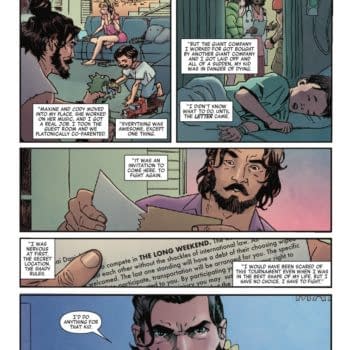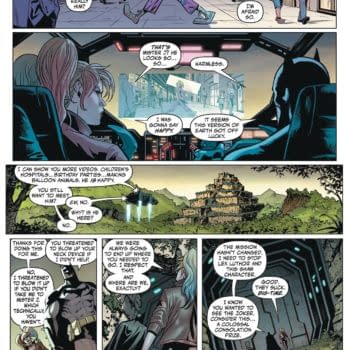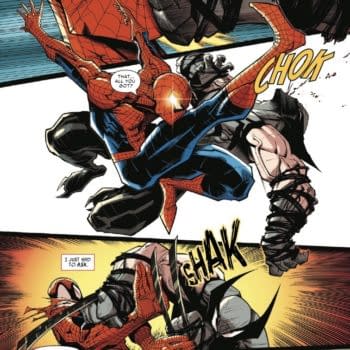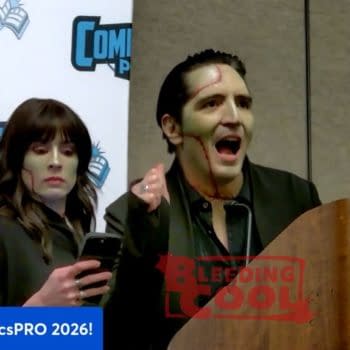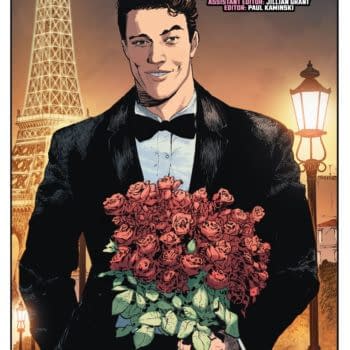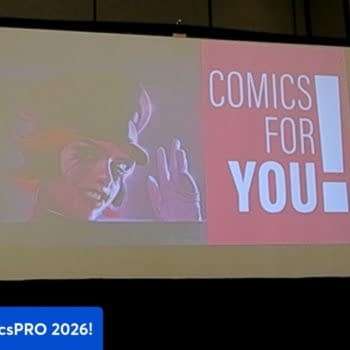Posted in: Comics, Recent Updates | Tagged: 2000ad, al ewing, andy diggle, ian edginton, judge dredd, New York Comic Con 2013, Slaine
Cracking Comics – Judge Dredd, Slaine, 2000AD At New York Comic Con With Ewing, Edginton, Diggle
At 36 years old, maybe you have to start being a little more responsible in life, making a little money, maybe even raising kids. Judge Dredd, Slaine, and 2000AD tick at least three of those boxes this year (let's leave the "responsible" thing out after all).
At New York Comic Con, the British Invasion, an "hour of sheer farce", as we were warned, brought us all the "celebration" behind the 36 years. The panel started with a massive shout-out spelling out 2000AD from the audience. No one had any problem doing a "cheerleader" intro to the panel. "Top comics talent" on the panel included Ian Edginton, Al Ewing, and Andy Diggle. 2000AD has a reputation for "finding new talent" and then the "Americans come along and they "steal them", according to the panelists.

Ewing introduced the "Al Ewing love-in" by reflecting that he was having a great con and loved everybody. With lots of big projects at Marvel announced recently, he described the process on 2000AD to be more about "pitching your own ideas, your own worlds" whereas "you're handed a bit more to work with when you make your initial pitch" when it comes to Marvel. Future Shocks, the self-contained 4-page strips that stand alone, is part of the farming route to working for 2000AD, and Ewing agreed that they are the best way to train oneself in brevity. 2000AD is one of the few places that still allows unsolicited material to be submitted, Ewing reminded fans. If you have a Batman story or Spider-Man story, there's no basic starting point, Ewing commented, but Future Shocks offers a way to get a foothold. It's possible to submit directly through the 2000AD website, actually, one of the few direct routes into the "mainstream".
Ewing and Diggle broke out some stories about the "source pile" submissions including angling stories and a submitter who felt that working in the Italian porn industry qualified him to be a sure-fire success in comics.
Edginton spoke about his work Brass Sun, a "steam-punk, clockwork" universe where a mechanical solar-system, life-size, with the sun winding down and a female hero on a quest, as a project where he has been able to "world-build from scratch". The second series has been written and Edginton is moving right on to the third series. Ian Culbard is the artist on the series. Edginton brought Brass Sun to 2000AD after working on it for a little while, putting material on the side and felt that "frankly there was nowhere else" where he would have "shoulder room to tell the story".
Ewing, writing Judge Dredd, is going to be "tying up a lot of the threads" on some long running ideas. Ewing cited Richard Stark's Parker as a "perfect person to put up against Dredd" that he started developing as an analog character in his work. He's writing a 6 episode "thing" for the magazine which shows what happens when Megacity collapses, and explores what happens to the criminal element.

The panel, by the way, was consistently interrupted by the "performance art" response of waiting for the phrase "who wants a graphic novel" at varying decibels and intervals to keep them on their toes, and the first responders took home a prize. We were also reminded, among all the "creator owned comics" buzz right now that 2000AD does publish them too.
During the Q & A, Ewing gave a window onto his creative process, involving plenty of pints:
Q: 2000AD has this long history of writers and artists sharing properties. What's the process like for the writer?
Ewing: On Dredd, I send the script and try to make it good for anyone, but with Zombo, we sit down with a script and try to think of what will make us laugh. Volume 2 of Zombo (3rd and 4th series) we sat down to have a pint and thought let's have a go at The Beatles. We were thinking, 'What can we do to make people hate us?" And from then on, we thought we might as well have a go at the Fantastic Four as well. There's the plotting session, which is much like a drinking session.
Hannah Means-Shannon is Senior New York Correspondent at Bleeding Cool, writes and blogs about comics for TRIP CITY and Sequart.org, and is currently working on books about Neil Gaiman and Alan Moore for Sequart. She is @hannahmenzies on Twitter and hannahmenziesblog on WordPress. Find her bio here.










